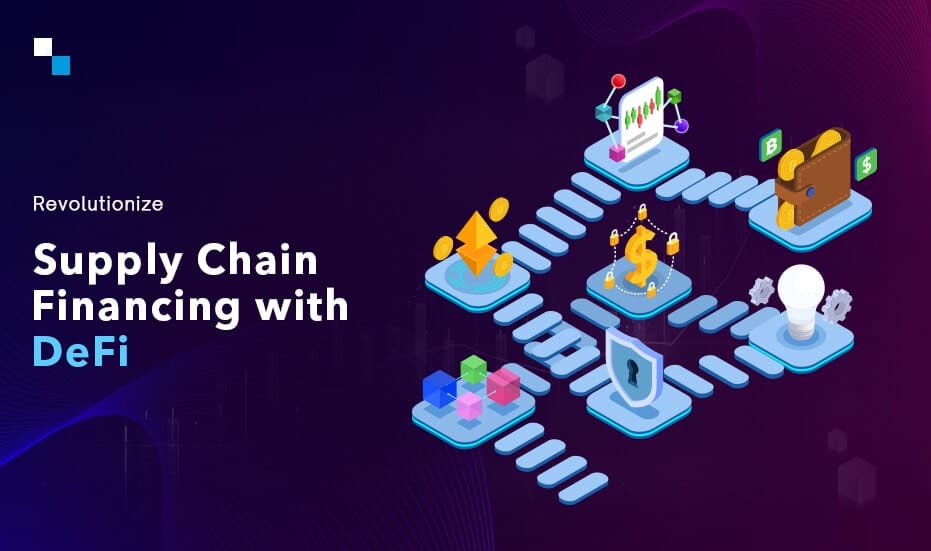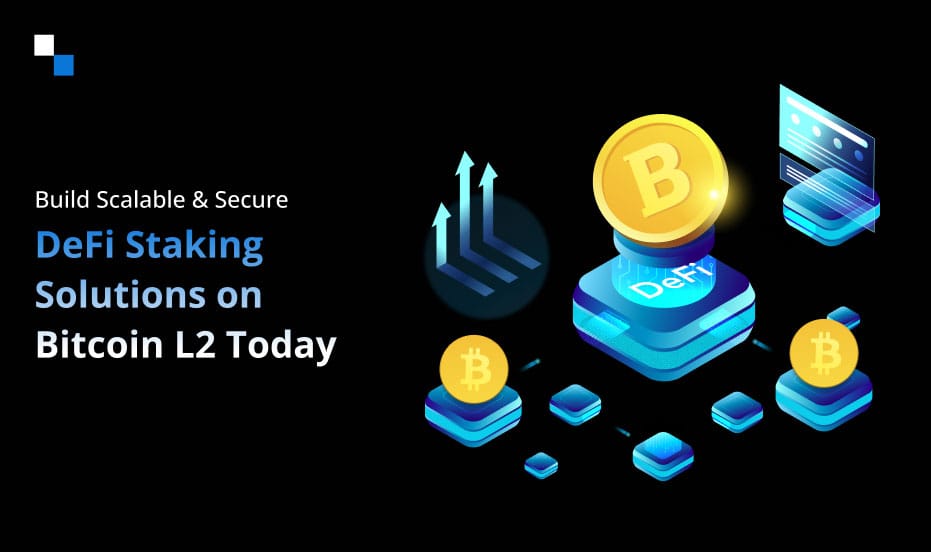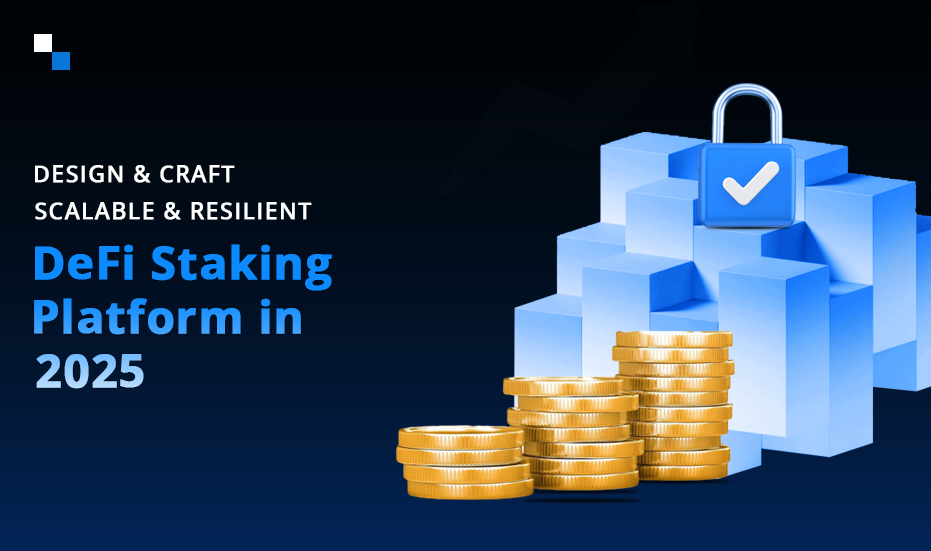Decentralized Finance, commonly referred to as DeFi, has been making waves in the world of finance. Without a doubt, it has been gaining momentum challenging traditional banking systems and offering innovative solutions across various industries. One of the sectors experiencing a profound transformation due to DeFi development services is supply chain financing. In this article, we’ll delve into the intricate details of how DeFi is revolutionizing supply chain financing, we’ll explore its benefits, real-world examples and its future. Let’s dive in!
Understanding Supply Chain Financing
Supply chain financing, also called supplier finance or reverse factoring, is a financial strategy used by businesses to optimize their working capital and increase the liquidity of their supply chain. Traditionally, this process involves a tripartite relationship between the buyer, supplier, and a financial institution, often a bank.
Here’s how traditional supply chain financing typically works:
- A buyer places an order with a supplier.
- The supplier delivers the goods or services.
- The buyer approves the invoice.
- The buyer’s bank or a third-party financial institution pays the supplier on behalf of the buyer.
- The buyer repays the financial institution at a later date, usually with interest.
With supply chain financing, businesses ensure a smooth supply chain operation. It provides suppliers with early payments, which can be critical for their cash flow management. However, traditional supply chain financing models have limitations, like lengthy approval processes, high transaction costs, and the risk of disputes.
The Rise of DeFi in Supply Chain Financing
DeFi has been making waves for some time now and many DeFi apps have been hugely successful. What exactly is DeFi? DeFi is a blockchain-based financial ecosystem that operates independently of traditional banks and financial intermediaries. It leverages smart contracts, digital currencies, and blockchain technology to create a decentralized and transparent financial infrastructure. Now, let’s explore how DeFi development is disrupting supply chain financing:
Decentralized Smart Contracts
DeFi platforms utilize smart contracts to automate and streamline supply chain financing processes. These self-executing contracts facilitate agreements between buyers, suppliers, and financiers. They eliminate the need for intermediaries.
Transparency and Traceability
Blockchain technology provides an immutable ledger that records every transaction within the supply chain financing process. It enhances transparency and trust among participants, which reduces the risk of fraud, and makes it possible to track goods and payments in real-time.
Global Accessibility
DeFi is accessible to anyone with an internet connection; it eliminates geographical barriers. It enables businesses to access a global pool of suppliers and financiers, which in turn, expand their options for supply chain financing.
Cost Reduction
DeFi platforms generally have lower transaction fees compared to traditional financial institutions. This cost-effectiveness benefits both buyers and suppliers.
Faster Processing
Decentralized finance development solutions are faster, thanks to the automation of tasks and reduced bureaucracy. Suppliers can receive payments promptly, improving their cash flow.
DeFi Solutions in Supply Chain Financing
Several DeFi solutions have emerged to address the challenges in supply chain financing:
- Asset Tokenization: DeFi enables the tokenization of real-world assets, including invoices and purchase orders. It helps in providing liquidity to suppliers. These digital assets can be traded and used as collateral, providing liquidity to suppliers.
- Decentralized Exchanges (DEXs): DEXs enable the trading of digital assets, including tokens representing invoices or supply chain assets. This liquidity can be used for working capital needs.
- Stablecoins: Stablecoins, which are cryptocurrencies pegged to the value of traditional fiat currencies, are commonly used in DeFi supply chain financing. They provide stability amid the volatility of cryptocurrencies like Bitcoin or Ethereum.
- Oracles: Oracles are data providers that feed real-world information into DeFi smart contracts. In supply chain financing, oracles can provide information about goods delivery, invoice approval, and payment status, ensuring contract execution accuracy.

Benefits of DeFi in Supply Chain Financing
The integration of DeFi into supply chain financing offers several advantages:
Efficiency
DeFi automates manual processes, reducing the time and effort required for transaction processing. This efficiency benefits both buyers and suppliers.
Cost Savings
Lower transaction fees and the elimination of intermediaries lead to cost savings in supply chain financing.
Accessibility
Small and medium-sized enterprises (SMEs) and suppliers in emerging markets gain access to affordable financing options through DeFi, fostering economic growth.
Transparency
Blockchain’s transparency ensures trust among participants, reducing the likelihood of disputes or fraud.
Global Reach
DeFi allows businesses to tap into a global network of suppliers and financiers, fostering international trade.
Liquidity
DeFi solutions provide suppliers with quick access to liquidity, enabling them to manage their working capital effectively.
Real-World Examples
Several real-world examples illustrate the impact of DeFi in supply chain financing:
- TradeLens: TradeLens is a blockchain-based platform that is used by supply chain participants to track the movement of goods. TradeLens has partnered with banks to provide financing to businesses that are using the platform.
- Walmart: Walmart is using blockchain technology to track the food that it sources from suppliers. Walmart is also working with banks to provide financing to suppliers that are using the blockchain platform.
- IBM: IBM is working with several companies to develop blockchain-based solutions for supply chain financing. IBM has developed a solution called “Blockchain Trade Finance,” specifically designed to help businesses get financing for their trade transactions.
- Maersk: Maersk is working with IBM to develop a blockchain-based platform for trade finance. The platform is called “TradeLens,” and it is designed to make it easier for businesses to get financing for their trade transactions.
- We.trade: We.trade is a blockchain-based platform utilized by banks to provide financing to businesses. We.trade has partnered with several banks, including HSBC, ING, and Santander.
The Future of DeFi in Supply Chain Financing
The integration of DeFi in supply chain financing is still in its early stages, but the potential for growth and disruption is significant. As more businesses recognize the benefits of DeFi, adoption is likely to accelerate. It’s important to address regulatory challenges for sustainable growth.
The future of DeFi in supply chain financing holds the promise of greater efficiency, transparency, and accessibility for businesses around the world. It has the potential to democratize access to financing, which is beneficial not only to large corporations but also SMEs and suppliers in emerging markets. As the DeFi ecosystem continues to evolve, it will reshape the way businesses manage their working capital and conduct global trade.
Conclusion
DeFi development has the potential to revolutionize supply chain financing. It can provide businesses with a more efficient, transparent, as well as secure way to get the financing they need. It can help businesses to grow and thrive in the digital economy.
Do you want to embrace DeFi for supply chain financing? Get in touch with Antier to build a robust DeFi solution as per your unique requirements.





